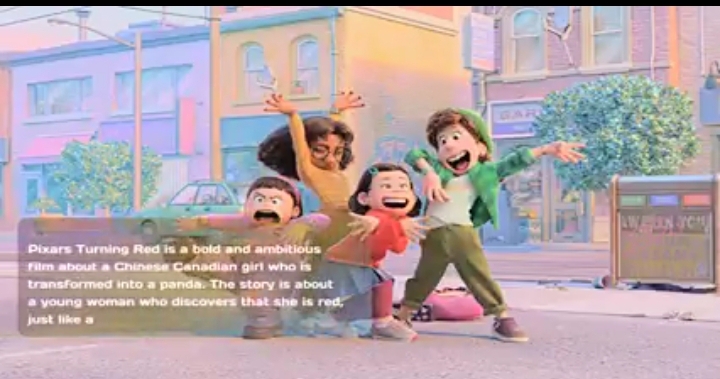The messiness of adolescence with refreshing honesty Turning Red confronts


The messiness of adolescence with refreshing honesty Turning Red confronts
The writer-director Domee Shi won an Oscar for her delightful Pixar animated short, Three years ago Bao.
In telling the sweet and surreal story of a Chinese Canadian mother and a steamed dumpling that comes to life, it captured something funny and poignant about the cultural and generational differences that can divide Asian immigrant families.
Turning Red, on her first feature Shi leans further into the complexities of Asian parent-child relationships — and this time, she’s come up with an even wilder conceit.
If you were to mash together Carrie and The Joy Luck Club, and somehow still get away with a PG rating, it might look a bit like this movie.
It follows a 13-year-old girl named Meilin Lee,which story is set in the early 2000s, and voiced by Rosalie Chiang, who lives in Toronto’s Chinatown.
Mei is an obedient overachiever, a straight-A student who spends her free time helping her parents run a temple built to honor their Chinese ancestors.
Mean While Mei’s father is shy and mostly stays out of the way, her mother, Ming — a terrific Sandra Oh — is attentive to the point of overbearing.
Talking addition more to the being super-involved with Mei’s studies, Ming rigorously polices her daughter’s social life, in hopes that she won’t be too influenced by Western ways.
But while Mei may look like the perfect daughter, she has interests of her own, like any teenager.
She’s starting to notice boys, and she and her friends are particularly obsessed with an ‘N Sync-style boy band. And then one morning, in a twist that riffs on Kafka’s The Metamorphosis and countless werewolf movies, she discovers that she’s turned into an enormous red panda, with bright red-orange fur and a long, bushy tail. She promptly flips out.
Director Shi, who wrote the script with Julia Cho, confronts the messiness of adolescence with an honesty that’s refreshing in the world of studio animation.
Mei’s transformation is clearly a metaphor for the onset of puberty, when your body betrays you and becomes unrecognizable overnight.
But it’s a metaphor for something else, too. As it turns out, the red-panda effect is the result of some very ancient Chinese magic that’s been passed down to Mei through the women in her family.











